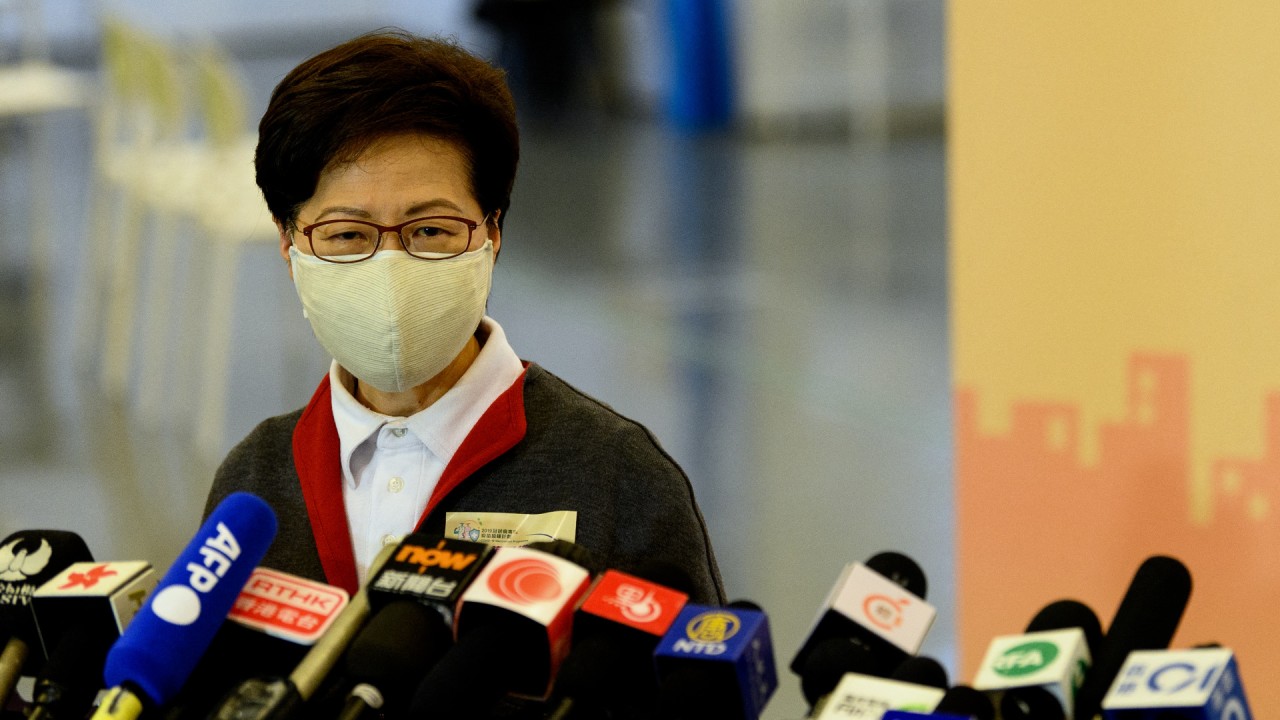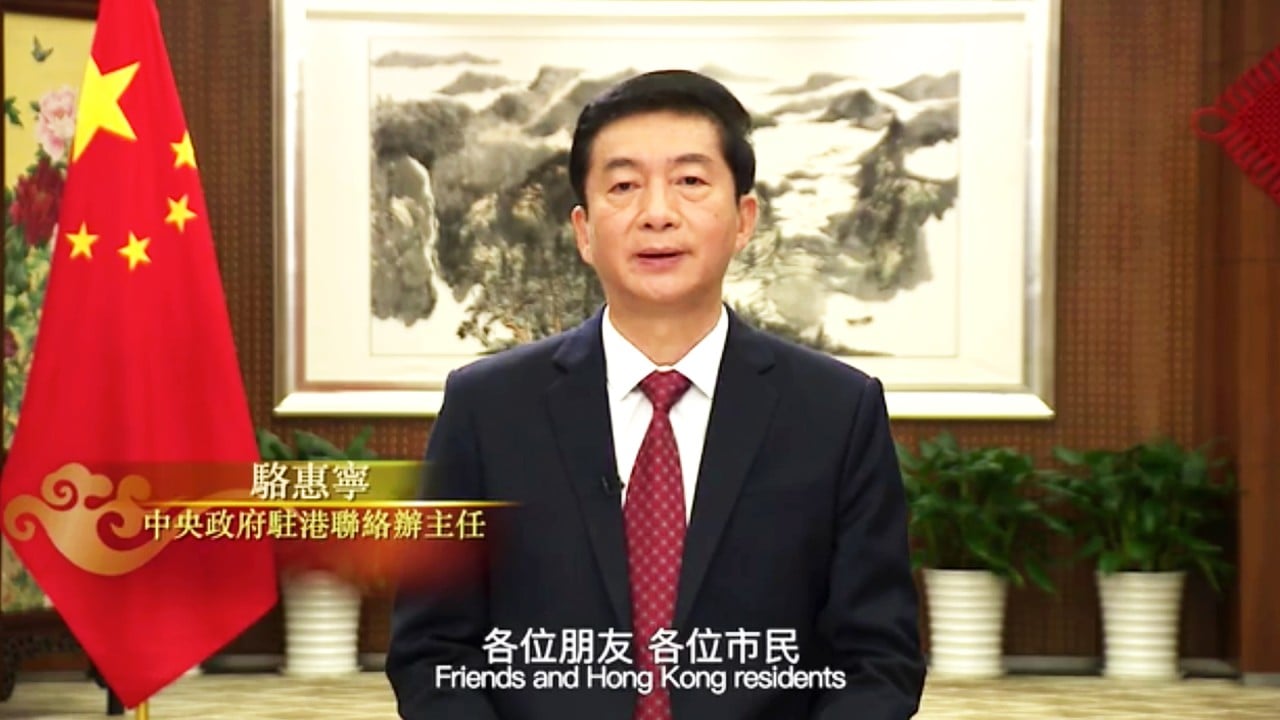
01:32
Electoral system needs to change so patriots rule Hong Kong, Carrie Lam says

Top Beijing officials gathered in Shenzhen on Sunday for a high-powered seminar on ensuring “patriots govern Hong Kong”, during which a former president of the Legislative Council called for drastic reforms to shake up Hong Kong’s legislature and district councils.
The sweeping changes proposed by Rita Fan Hsu Lai-tai, also a former delegate to the National People’s Congress Standing Committee, include requiring candidates to obtain nominations from the Election Committee, a 1,200-member body dominated by pro-establishment business elites and community leaders, before running as lawmakers.
Sunday’s seminar was joined by Xia Baolong, head of the State Council’s Hong Kong and Macau Affairs Office, his deputy Zhang Xiaoming, and Luo Huining, director of Beijing’s liaison office in Hong Kong.
Phoenix TV reported that during the seminar, Xia said: “The important message that the central government has repeatedly expressed to Hong Kong is that ‘one country two systems’ will not change, not now, not in the future”.

01:32
Electoral system needs to change so patriots rule Hong Kong, Carrie Lam says
Xia also said after more than 20 years of implementation, “one country, two systems” had proved to be a fit for China’s national development, and the situation in Hong Kong. The policy of “Hong Kong people governing Hong Kong” must be executed by patriots, he added.
According to the broadcaster, about 30 people attended the seminar. Apart from Xia, Zhang and Luo, Zheng Yanxiong, head of Beijing’s national security office in Hong Kong, as well as several mainland academics, were also there.
From the Hong Kong side, apart from Fan, attendees include Basic Law Committee member Albert Chen Hung-yee, Executive Council member Arthur Li Kwok-cheung, property tycoons Gordon Wu Ying-sheung and Peter Woo Kwong-ching, and economist Professor Lawrence Lau Juen-yee.
Endorsing earlier suggestions raised by pro-establishment figures, Fan also proposed scrapping district councillors’ 117 seats on the committee, which will elect the city’s leader next year, and give it to pro-Beijing members of prominent mainland Chinese groups, such as the All-China Federation of Industry and Commerce, and All-China Women’s Federation.
She also suggested abolishing the five so-called super seats in the legislature, and breaking the current five geographical constituencies into at least 10.
Fan said her proposals were aimed at ensuring at least two-thirds of the seats in the legislature would be taken by “those who are clearly patriots”.
The two-thirds majority was seen as a crucial number as the passing of some of the legislature’s most important proposals require such a high proportion of support. Such proposals include any political reform initiated by the Hong Kong government.
Xia had declared in a forum in Beijing last Monday that Hong Kong’s administrative and electoral systems needed a fundamental revision to ensure only patriots held key positions in all three branches of government – the executive, legislature and judiciary – as well as statutory bodies.
The latest seminar in Shenzhen also came days before the launch of the annual plenary session of the Chinese People’s Political Consultative Conference (CPPCC), the country’s top political advisory body, and the National People’s Congress (NPC), the country’s highest legislature.
Sources previously told the Post that apart from endorsing China’s next five-year plan, the NPC and the CPPCC would scrutinise Beijing’s move to shake up the city’s electoral systems based on the patriots principle.
In a report on Sunday, Xinhua said that the “relevant authorities of the central government organised the two-day seminar to widely listen to the views of people, from various sectors in Hong Kong, on improving the city’s electoral system, and implementing ‘patriots governing Hong Kong’”.

02:42
Beijing’s liaison office chief Luo Huining stresses principle of ‘patriots governing Hong Kong’
According to a source, during the seminar, Xia said because “national sovereignty and the power to govern are two inseparable concepts”, the central government needed to introduce new measures to reform Hong Kong’s electoral system as a priority.
After the seminar, Basic Law Committee member Professor Albert Chen said he expected the upcoming plenary session of the NPC to lay down principles of Hong Kong’s electoral reforms. This would be followed by the standing committee in the coming several months.
“This could involve amending the electoral laws of chief executive election and Legco election,” Professor Chen, who is also a legal scholar at the University of Hong Kong, said. “To be more concrete, it could involve the number of seats of various sectors in the Election Committee, and the way of elections might also be amended.”
According to Chen, this could involve changes to the boundaries of geographical constituencies, while it was possible “the number of seats [among various functional constituencies] would be reallocated, and there would be new functional constituencies”.
In March next year, Hong Kong’s 1,200-member Election Committee, which comprises business elites, professionals, community leaders, politicians and 117 district councillors will elect the city’s next leader. The 117 seats were all set to go to the opposition camp, as they have won a landslide victory in the 2019 polls, which was held months into anti-government protests erupted in June that year.
Fan told reporters, after the seminar, she believes the district councillors should not be allowed any seats on the committee because “only those who love the country and love Hong Kong can sit on it”.
“Those hoping to contest in the Legco elections should also be required to obtain a prescribed number of nominations from members of the Election Committee,” she said.
Fan said under Article 97 of the Basic Law – the city’s mini constitution – district councils were advisory bodies. Therefore, they should not be represented on the committee in the first place.
“As they are not organs of political power, we need to consider whether district councillors should still be allowed over 100 seats, or almost one-tenth of the seats, on the Election Committee,” she said.
Fan proposed abolishing the five super seats in Legco. These are five district council (second) constituency seats of which members are elected by Hong Kong voters who do not have a vote on other traditional, trade-based functional constituencies such as commerce and accounting.
She also wanted to revive the old practice of allowing Election Committee members to pick several representatives in Legco. From 1998 to 2000, 10 of the seats in the 60-member legislature were returned by members elected by the committee. The number dropped to six from 2000 to 2004, when the system was scrapped.
Under the present system, the legislature is composed of 70 members, with 35 elected from five electoral districts defined by geographical boundaries, and the other 35 returned by trade-based functional constituencies.